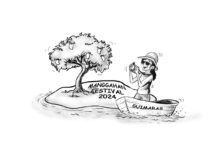
IT COULD be argued that many of our local government units (LGUs) could barely take care of their human populations, such that they may not have the interest at all to even care for the wildlife in their jurisdictions.
I think, however, that that is a faulty argument, because when politicians run for public office, they should be able to provide attention to a whole gamut of concerns, not just for human oriented services, but also for the environment, including all of God’s creation, which of course includes wildlife.
If any politician will declare that he or she has neither the time nor the interest to protect wildlife, then he or she should have no business running for office, and if he or she does run, then the people should not even vote for him.
Besides, wildlife is part of the environmental balance of nature and if a politician does not value the environment, then the people should not value him also.
I believe that the first duty of a public official is to find out what are the wildlife species that are still living in their jurisdictions, especially those that are already endangered. Not unless they know that, they may not be able to make intelligent decisions when it comes to approving or disapproving the environmental impact statements of project proponents.
For example, the Tarsier is found not only in Bohol, but also in Samar, Leyte and Mindanao. And there are species of native deer and wild boar that could still be found in local forests.
Can anyone tell me which LGUs are not protecting their wildlife?
MAINTENANCE OF BIOMEDICAL EQUIPMENT
It’s a sad reality in government offices that vehicles, machineries and equipment are condemned by declaring these as “unserviceable”, even if in reality, these are still repairable. There is a rule in government that it is acceptable to repair defective items for as long as the cost of the repair will not exceed half of the acquisition cost.
More often than not however, some government find it “easier” to buy new items rather than have these repaired. When the computer technologies shifted from Local Area Networks (LANs) to the cloud, the burden of repairs lessened, as the workload shifted from onsite to online.
That is the case of office computing, but that is not going to be the case when it comes to hospital automation. In the case of the latter, most of the equipment would still be onsite. Although biomedical equipment are technically just computer equipment also, the latter are more difficult to maintain and repair, aside from the fact that these are mostly mission critical and would usually be used in life and death situations.
That is the reason why biomedical repair and maintenance would require higher sets of skills. Dr. Luis Ramon Rodriguez, President of Philippine Medical Depot (PMD) has found a way to train highly skilled biomed technicians in his specialized school, and he also makes these technicians available to all hospitals if and when needed. They could also be hired by these hospitals if necessary./PN




